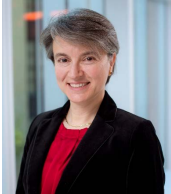Guest seminar by Prof. Yildiz from MIT: Understanding and tuning the surface chemistry of perovskite oxides to activate oxygen exchange and water splitting reactions

The deployment of decarbonization technologies, including solid oxide fuel and electrolysis cells, is limited by slow rates of conversion reactions at surfaces, and instability of materials under operating conditions. A major scientific challenge has been the lack of knowledge of the chemistry and electronic structure on material surfaces in the harsh operational conditions. Bulk transport properties of stateof-the-art perovskite type oxides in these applications are well-studied. In contrast, how the surfaces of these materials are affected by the electrochemical environment at elevated temperatures, and how these surfaces in turn affect the conversion reactions, including oxygen exchange and water splitting, have not been fully explored. Yet it is the surface that governs the reaction kinetics. In this talk, I will first discuss our research in revealing the chemical and electronic nature of surfaces in relation to oxygen exchange reactions on perovskite oxides, using in situ surface-sensitive techniques and with first-principles-based calculations. This new knowledge has guided us to design surface chemistries that eliminate a key degradation mode at the surface, and improve both activity to oxygen exchange reactions and stability. Second, I will discuss our research in understanding and controlling the formation of metal nanoparticles at perovskite oxide surfaces, to catalyze water splitting reactions. This process, called exsolution, has attracted great interest as a means to form stable metal catalyst particles on oxide supports. However, the physical factors that control the size and density of such exsolved particles are far from quantified at preset. Our research using lattice strain and ion irradiation, has shown that point defects have a key role in affecting both the thermodynamics and the kinetics of the exsolution process. Furthermore, we have revealed how the near surface region and the interior of the perovskite oxide, can undergo drastic chemical and structural changes during the metal exsolution process, with significant implications to surface reactivity as well as bulk electronic and magnetic properties. While this body of work has been pursued in the context of solid oxide fuel and electrolysis cells, the findings broadly impact also other fields that use perovskite oxides, such as in photo-electrochemical and thermochemical splitting of water, CO2 reduction, and memristive information processing.
Speaker Bio:
Bilge Yildiz is the Breene M. Kerr (1951) Professor in the Nuclear Science and Engineering and the Materials Science and Engineering Departments at Massachusetts Institute of Technology (MIT), where she leads the Laboratory for Electrochemical Interfaces. Yildiz’s research focuses on laying the scientific groundwork to enable next generation electrochemical devices for energy conversion and information processing. The scientific insights derived from her research guide the design of novel materials and interfaces for efficient and durable solid oxide fuel cells, electrolytic water splitting, braininspired computing, and solid state batteries. Yildiz laboratory has made significant contributions in advancing the molecular-level understanding of ion diffusion, oxygen reduction, water splitting and charge transfer mechanisms in mixed ionic-electronic conducting oxides. Yildiz’s research has uncovered the effects of surface chemistry, elastic strain, dislocations, and strong electric fields on the reactivity, efficiency, and degradation in these applications. Her approach combines computational and experimental analyses at the atomic and electronic level, using in situ scanning tunneling and X-ray spectroscopy together with first-principles calculations and novel atomistic simulations. Yildiz’s teaching and research efforts have been recognized by the Argonne Pace Setter (2006), ANS Outstanding Teaching (2008), NSF CAREER (2011), IU-MRS Somiya (2012), the ECS Charles Tobias Young Investigator (2012), the ACerS Ross Coffin Purdy (2018) and the LG Chem Global Innovation Contest (2020) awards. She is a Fellow of the American Physical Society (2021), the Royal Society of Chemistry (2022), and the Electrochemical Society (2023) and an elected member of the Austrian Academy of Science (2023).
